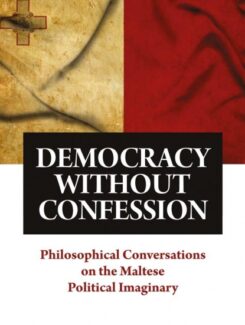Democracy Without Confession
These conversations are an implicit critique of those paternalistic forms of political discourse and action that regard citizens as passive recipients who would invariably concur with the Party, Church or the Establishment. The conversations clearly express a certain amount of anxiety over the fact that not unlike other societies, Maltese society has become trapped in the limitations of performativity and expertise, where democracy is slowly being eroded by new forms of power that appear to move beyond raditionalist hegemonic matrices while retaining even higher degrees of authority.
In these conversations, authors John Baldacchino and Kenneth Wain engage with philosophical traditions that provide a pluralistic logical horizon—what William James calls “a federal republic”—that reaffirms their critique and rejection of foundationalist, confessionalist and didactic discourses.
Both authors hope to open a discussion that starts from the Maltese political context but which then moves into a wider treatment of matters related to how the making of a civil society in times of constant change must highlight the urgent need to reassess the state and condition of democracy.
ABOUT THE AUTHORS
John Baldacchino is Chair of Arts Education at the University of Dundee in Scotland. He served as Associate Dean of Graduate Studies and Professor of Arts Pedagogy at Falmouth University in England; as Associate Professor of Art & Art Education at Columbia University’s Teachers College in New York; as Reader in Critical Theory at Gray’s School of Art in Scotland, and as Lecturer of Arts Education and Cultural Studies at the University of Warwick in England. He is the author of papers, articles, chapters and books on the arts, philosophy and education. His books include Post-Marxist Marxism: Questioning the Answer (Ashgate 1996), Easels of Utopia: Art’s Fact Returned (Ashgate 1998), Avant-Nostalgia: An Excuse to Pause (2002); Education Beyond Education: Self and the Imaginary in Maxine Greene’s Philosophy (Peter Lang 2009); Makings of the Sea: Journey, Doubt and Nostalgia (Gorgias 2010); Art’s Way Out: Exit Pedagogy and the Cultural Condition (Sense 2012) and John Dewey: Liberty and The Pedagogy of Disposition (Springer 2013). He just finished co-editing two further volumes, one on art education in the Mediterranean (with Raphael Vella) and a book of essays on the work of Kenneth Wain (with Duncan Mercieca and Simone Galea). His Mediterranean aesthetics project, of which Makings of the Sea was the first volume, is on course, with the second volume Composed Identities: Sound, Number and Desire planned for completion between the end of 2014 and early 2015.
Having studied at the University of Malta (where he received his B.Ed.), the University of Warwick (graduating with an MA and PhD, and where he had his academic apprenticeship as faculty for seven years), and having become closely connected with the American academic scene at Columbia University, Professor Baldacchino’s work is deeply engaged in academic, educational, artistic, and political contexts that span across Britain, the United States and Europe. Though his work takes him beyond Maltese shores, his connections to Malta are deep rooted and go back to his political writings for the Maltese press in the mid-to-late 1980s and the early 1990s where he contributed numerous articles on the arts, culture and political affairs. More recently he contributed to the debate on divorce, the recent general elections and the plight of refugees. His interest in political philosophy is mainly driven by his academic work, especially the spheres of the politics of aesthetics, arts research, and philosophy of education, through which he has collaborated with academics and luminaries that include Maxine Greene, Ernesto Laclau and Jacques Rancière.
Kenneth Wain is professor at the University of Malta where he served as Head of the Department of Education Studies and Dean of the Faculty of Education for several years, and where he currently teaches philosophy of education and moral and
political philosophy. He received his PhD from the University of London.
Over the years he has published numerous articles in these areas in peer-reviewed academic journals as well as in chapters in books (published by Routledge, Blackwell, Springer, Rowman and Littlefield, Peter Lang). He has also authored the following books: Philosophy of Lifelong Education (Croom Helm, 1987), The Maltese National Curriculum: a Critical Evaluation (Mireva, 1991), Theories of Teaching (Mireva, 1992), The Value Crisis: an Introduction to Ethics (Malta University Press, 1995), The
Learning Society in a Postmodern World (Peter Lang, 2004), and On Rousseau: An Introduction to his Radical Thinking on Education and Politics (Sense, 2011).
Professor Wain was involved with the writing of the reports and studies that brought the most significant educational reforms and influenced educational policies in Malta in the last decade of the 1990s and the first of the 2000s, chairing committees and foundations and participating in policy groups advising the Ministry of Education. He has attended and presented papers at various conferences over the years, has also written several articles on educational, political and ethical issues in the popular press and debated on these subjects on the broadcast media.
At present he is contracted to write a full-length book on Rousseau and our contemporary thinking on politics and education for Routledge Taylor and Francis (London & New York) and has just submitted a volume of unpublished collected papers to the Malta University Press for publication.
By: John Baldacchino & Kenneth Wain.
Format: Paperback
No of pages: 320
Published: 2013


Reviews
There are no reviews yet, would you like to submit yours?